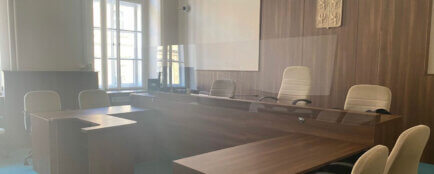The crux of the dispute was an edited version of the CEZ advertising spot entitled “Lighting of Christmas Trees”. Greenpeace altered the original spot by adding footage of damaged, dry and deforested forests and forest fires. In addition, it added its comment that ČEZ is harming the environment through its activities.
Are you solving a similar problem?
Are you facing a legal problem that is beyond your capabilities and does not fall under any of our legal services?
We will assess your case and draft a proposal for legal services to resolve it within 24 hours. If you then decide to entrust its solution in our hands, you have the drafting of the proposal free of charge.
I want to consult
- When you order, you know what you will get and how much it will cost.
- We handle everything online or in person at one of our 6 offices.
- We handle 8 out of 10 requests within 2 working days.
- We have specialists for every field of law.
ČEZ did not agree with such a modification of its spot and decided to defend itself against the misuse of the advertising clip. And it succeeded. At least in the first instance, when the Municipal Court in Prague ordered the environmental organization to refrain from unauthorized use of the spot and ČEZ to apologize. In its decision, the Municipal Court generally admitted the use of the statutory licence, but not in this case. according to the court, the “work” created by the association did not meet the definition of a new work and was merely a misuse of the original work in order to disparage ČEZ.
The High Court in Prague took a different view and dismissed ČEZ’s claim. According to the court, the modified commercial is ironic in relation to the original version. It also stressed freedom of speech. The Supreme Court also rejected the company’s appeal as it did not find it admissible.
The Constitutional Court concluded the case with similar reasoning, according to which humour, exaggeration, irony and sarcasm are a necessary part of social dialogue and contribute to the free exchange of views. Such expressions are therefore protected by freedom of expression, provided that they do not exceed generally accepted rules of decency.
Conversely, interference with the freedom of such speech must be viewed with caution. This is thus again a variation on the classic constitutional law theme of a conflict between two fundamental rights or values.
In particular, the Constitutional Court has stressed the need to examine speech in its entirety and not in isolation. It therefore makes a difference, in its view, whether it is a written text, a comic strip or a spot. What is also relevant is its intention, i.e. whether, for example, the resulting work contributes to the public debate on social issues or, on the contrary, is merely directed towards hatred. In the latter case, such speech could not stand under the protection of freedom of expression.
According to the Constitutional Court, it was clear from the outset, upon viewing the altered spot, that it was not an official advertisement of ČEZ, but an effort by someone else to draw attention to the environmental impact of its activities. Moreover, a company of such size and importance is obliged to bear a tolerable level of criticism of its activities, which, moreover, do have a significant impact on the environment. In an earlier decision, the Constitutional Court quoted Jean-Jacques Rousseau, who prophetically stated that “social man lives constantly outside himself, knows no other life than that in the opinion of others, and only from their judgment does he gain a sense of his own existence.” The psychological skills of self-distance, self-irony, and generally a sense of humor help one to get out of this “fishing rod.” By contrast, judicial decisions in similar cases decreeing de facto what people can still laugh at or what is already obscene and offensive would, in the vast majority of cases, constitute an unconstitutional restriction on free speech. It is primarily for the public, and not the courts, to take a position on a particular political cartoon and whether the author’s assessment of a particular situation is in poor taste or, on the contrary, humorous and persuasive.
A significant moment in the new decision was the statutory licence and the Supreme Court’s interpretation of it, which departed from the law to some extent. Although the statutory licence for caricature and parody should, according to the (explicit) wording of the law, apply only to copyright, the Supreme Court held that it can be similarly applied to copyright-related rights. Thus, a parody may also consist of altering an audiovisual work by inserting new footage.
In this context, the Constitutional Court added that the court may (and must) deviate from the literal wording of the law in certain circumstances. It may do so only if the purpose of the law, the history of its creation, its systematic coherence or one of the fundamental principles of the legal order requires it.
The Constitutional Court’s finding was remarkable in another respect, namely, in explaining the meaning of parody, exaggeration and humour, it quoted some famous classics, including Umberto Eco, who, through the hero of the novel The Name of the Rose, William of Baskerville, contradicts the librarian Jorge’s view that ‘laughter is the weakness, the corruption and the flabbiness of our body. It is the consolation of peasants, the exuberance of drunkards; even the Church in its wisdom has instituted moments of festivity, carnival and fair, those daily pollutions which expel excess of drink from the body and protect it from other desires and other ambitions. But so laughter remains something low, the defence of the common people, desecrated by the mystery for the rabble.” To this William of Baskerville says: “They have lied to you, the devil is not the ruler of matter, the devil is the presumption of the spirit, faith without a smile, the truth that is never seized by doubt. The devil is frowning because he knows where he is going, and he is always going where he came from.” It may be added that humour, satire and parody are life-giving, not only in ordinary life but also in public life, because they can reduce social tension.
We can also highlight a quote from Václav Havel, who in an essay on the nature of Czechoslovak dissent writes:“…whoever takes himself too seriously soon becomes ridiculous, and whoever can constantly laugh at himself cannot be truly ridiculous.“




